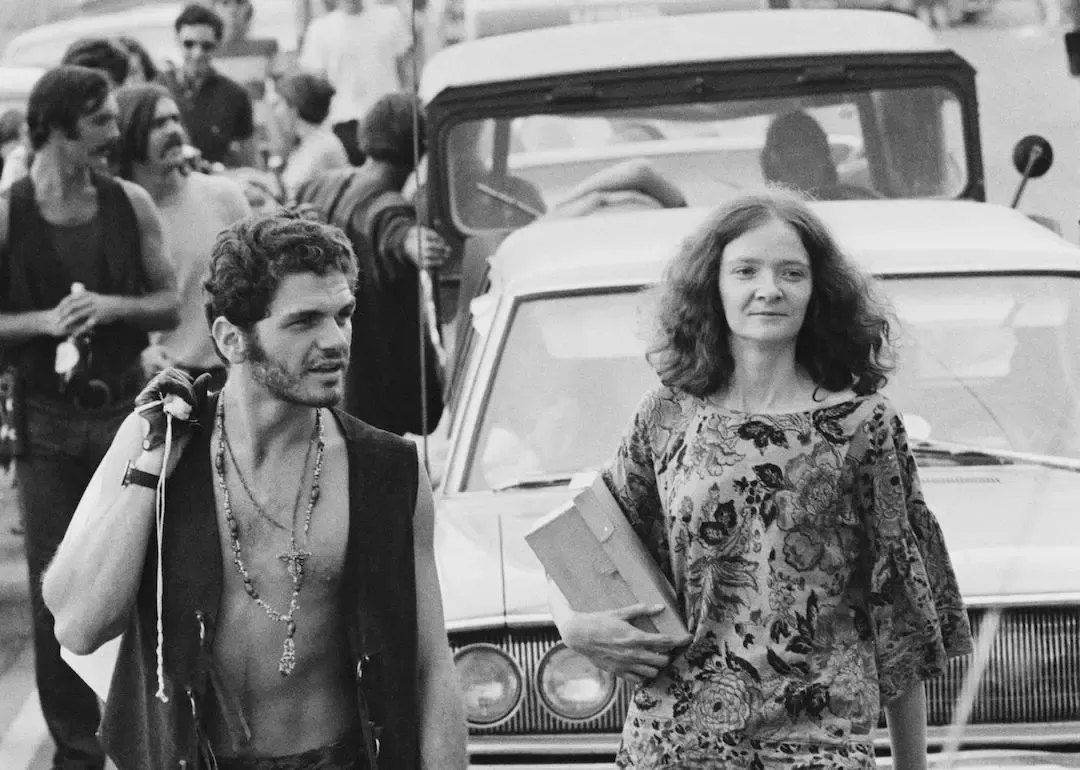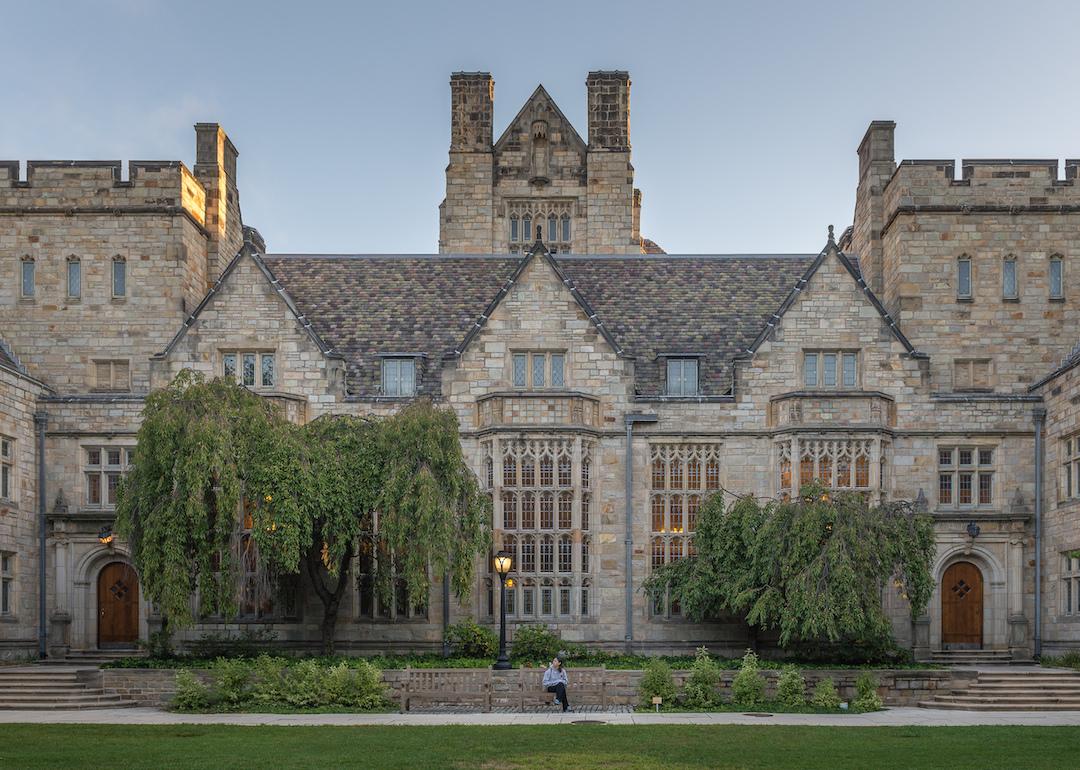
The original Woodstock, by the numbers
Three days. Thirty-two acts. Five hundred thousand people…and 600 porta-potties.
The 1969 festival known as Woodstock took place from Aug. 15-18 in Bethel, New York, and would've been the biggest disaster in music festival history if not for the fabled musical performances and the harmonious spirit of the attendees. Rain delays messed with the schedule and muddied the festival grounds; it was nearly impossible to find friends if you split up; there were two deaths and numerous arrests for hard drugs, and a tractor crushed one fan. Despite these setbacks, some of the most legendary artists in rock history gave performances that have since been immortalized in the pop-culture imagination.
Woodstock 1999, the festival planned for the 30th anniversary of the original, literally went down in flames, and Woodstock 2019, the festival planned for the 50th anniversary, fell apart at the seams. The festival's 55th-anniversary celebration, which took place in August 2024, went off without a hitch—but still, we might never get another music festival like the original Woodstock. The original had its issues, too: The festival was banned from its first location, Wallkill, New York, after local residents rejected them. They were also rejected from the town of Saugerties and barely got the permits from Bethel in time to set up the necessary structures. With large gaps in fencing, the organizers were forced to make the festival free as hundreds of thousands of fans descended on the festival grounds, kicking off a muddy, dirty, overcrowded, unsanitary, legendary three-day spectacle.
In honor of the original Woodstock, Stacker rounded up 20 facts and figures that sum up the original three days of peace and music. From the number of babies allegedly born during the festival to the amount artists were compensated, this is our inside look at the greatest music event of the century.
600 porta-potties
All in all, around 500,000 people attended Woodstock over the three days of the festival. Whereas Yankee Stadium, for example, has one toilet for every 62 fans, Woodstock only had one toilet for every 833 music fans.
186,000 tickets sold
186,000 tickets were sold in advance, with prices ranging from $120 in today's dollars in advance and $160 at the gate. When hundreds of thousands of fans unexpectedly showed up, combined with fencing that couldn't keep them out, the only option was to open the gates and let everyone in for free.
$18 tickets
The weekend-long event cost $18—about $120 in 2019. In comparison, a three-day pass to this year's Coachella music festival in California cost $429 for general admission. Coachella's headliners were Childish Gambino, Tame Impala, and Ariana Grande, compared to Woodstock's notable acts like Crosby, Still, Nash & Young, The Grateful Dead, Joan Baez, Jefferson Airplane, and 28 others.
2 fatalities
There were two deaths among Woodstock's 500,000 attendees. One death was from a drug overdose, and the other was death by tractor: Someone set up a sleeping bag under a tractor, which was started by its unwitting owner and moved, crushing the festival attendee.
300,000 extra people
More than double the amount of ticket holders showed up at Woodstock's proverbial gates. This spelled out a problem for the event's organizers, who promised authorities from the town of Bethel, where the festival was held, that no more than 50,000 people were expected to show up. When they were eventually forced to make the festival free, they were left nearly bankrupt, but subsequent documentaries and live recordings paid them huge returns.
5:15 p.m. start time
Richie Havens kicked off Woodstock at 5:15 p.m.—hours before his scheduled start time. Traffic had kept the openers from making it to the stage on time, which left Havens to go through his entire repertoire. "Freedom," one of the most iconic Havens songs, was ad-libbed by the musician as he made it up on the fly to fill out his impromptu set.
3 days
Woodstock hosted 32 acts over the three days of the festival, including rock 'n' roll legends both established and only beginning. In fact, Rolling Stone named it as one of the top 50 moments that changed rock 'n' roll history, calling it "the greatest rock festival ever" and "the decade's most famous and successful experiment in peace and community."
2 mythic births that may or may not have happened
There were probably quite a few babies that were conceived during Woodstock's three days, but only two births, according to the concert's medical director: one at a local hospital, after the mother was flown out of the festival in a helicopter, and the other in a car trapped in the endless traffic jam of cars leaving the site. There have been contradictory reports of newborn-sightings, so it's tough to say how many births did actually happen at Woodstock.
$18,000 fee for Jimi Hendrix
Jimi Hendrix was the festival's highest-paid performer; he made $18,000 in 1969 dollars for his set, which included his rendition of "The Star-Spangled Banner," and which amounts to over $130,000 in today's dollars. Blood, Sweat & Tears and Joan Baez were paid the second- and third-most paid, at $15,000 and $10,000, respectively.
4-hour documentary
"Woodstock," a documentary about the events of the festival, which contains plenty of live concert footage, was incredibly popular despite its sprawling runtime, going on to earn an Academy Award for Best Documentary and a nomination for editor Thelma Schoonmaker, who edited the film alongside Martin Scorsese and others. The original theatrical cut ran only three hours; a 1994 director's cut runs 224 minutes.
80 arrests
Drug use was rampant at Woodstock. Though marijuana smoking was incredibly common at the festival, but most of the 80 arrests were drug charges for harder drugs, like LSD, amphetamines, and heroin.
$750,000 in estimated expenses
When the festival organizers threw up their hands and tore down the fences, making the festival free, they were resigning themselves to bankruptcy. The organizers spent $2.5 million while collecting only $1.5 million, though payments from the documentary and subsequent works have helped them recoup the losses, and then some.
2006 founding of Bethel Woods Center for the Arts
The very ground on which the festival took place is now the Bethel Woods Center for the Arts, an outdoor amphitheater that, since its opening in 2006, has hosted everyone from Neil Young to Lady Gaga. Nearby, there's a museum detailing the history of Woodstock with archival documents and rare footage.
4 organizers with one big dream
All four of them 27 or younger, the four organizers of Woodstock scored a win when Creedence Clearwater Revival decided to perform at the festival, which gave them leverage to rope in more and more acts. Michael Lang had organized a music festival before, 1968's Miami Music Festival, and Artie Kornfeld was a VP at Capitol Records. John Roberts and Joel Rosenman, the other two organizers, were New York entrepreneurs with dreams of opening their own recording studio.
70 miles: the distance from Woodstock to Woodstock
The organizers originally wanted to build a music studio in Woodstock, New York, which remains a town with a strong connection to the arts. Though those plans fell through and they decided to go with a festival, they kept the name, and eventually found a spot in not-so-nearby Bethel.
Third-largest city in New York State
Generally, rankings of the largest cities in any given state don't change overnight. However, with the 500,000 people that attended the festival, little Bethel, New York, became the state's third-largest city for three days.
32 musical acts, $140,700
Just under 1 million dollars in today's cash was paid out to Woodstock's artists. Nowadays, a single headliner for a massive festival like Coachella can demand $3 or $4 million in payment.
1 injury by guitar
While the festival itself had zero reported incidences of violence, there was an altercation on-stage as Abbie Hoffman grabbed the mic during a set by The Who. Hoffman bellowed about freeing Peter Sinclair from jail, but was cut short by Who guitarist Pete Townsend, who used his own guitar to hit Hoffman upside the head while shouting "Get off my stage!"
2 bands didn't make it
The Jeff Beck Group broke up a few weeks before Woodstock, while Iron Butterfly got stuck at LaGuardia Airport. Rumor has it the bandmates requested that they be picked up by helicopter—a request that was denied.
$10,000 location fee
Festival organizers paid dairy farmer Max Yasgur $10,000 for the use of his hay fields for the festival (not his actual dairy farm, as is commonly thought). Damages ran closer to $50,000. His business was also nearly ruined by the event: Locals boycotted Yasgur's milk and refused him service at the town store and diner.



